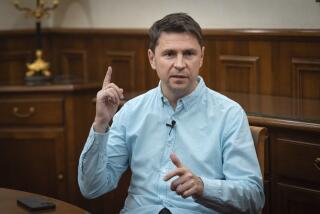Can Yeltsin Really Be Trusted? U.S. Officials Are Still Not Sure : Diplomacy: Some see a valuable ally in the powerful Russian leader. Others call him too unpredictable.
- Share via
WASHINGTON — Secretary of State James A. Baker III is seeking meetings with the leaders of all 15 of the Soviet Union’s republics during his visit there next week, an unprecedented mission that reflects an unsettling reality: The upheaval in Moscow has put the future of a superpower into the hands of new leaders whose views on the outside world are largely unknown.
Administration officials confess that they are still largely baffled by the impact of the Soviet Union’s disintegration on international security--from the question of who controls Moscow’s nuclear weapons to the riddle of how the republics plan to pursue separate foreign policies alongside a joint policy made in Moscow.
And what little they know about the new generation of Soviet leaders is sometimes contradictory, especially in the case of Boris N. Yeltsin, the increasingly powerful president of the Russian Federation.
Government analysts who have been combing Yeltsin’s foreign policy statements believe that he may be prepared to strike a major new bargain with the West, trading long-sought concessions on several foreign policy issues for significant Western aid to his sinking economy.
But they remain uncertain, they say, because Yeltsin and his aides have said different things at different times. And the foreign policy views of other new figures on the Soviet scene, from the president of the Ukraine to the Muslim leaders of Soviet Central Asia, are even more obscure.
“We want to have a relationship with all of them,” one senior Administration official said Thursday. “In one shape, fashion or form, we want to see them all.”
So far, officials said, the foreign policy news from Moscow has been nothing but good. Yeltsin, Andrei Kozyrev, the Russian republic’s foreign minister, and Boris N. Pankin, the newly appointed foreign minister of Gorbachev’s central government, have all said that they want to pursue better relations with the West. And all three have said that they want to phase out Soviet aid to Cuba, a move the United States has long urged.
But some U.S. officials fear that Yeltsin may turn out to be an unpredictable partner in foreign policy, in part because at home he often sounds like a traditional Russian nationalist--a breed that for generations has sought to retain Russian territory and expand its influence, not bargain them away.
One senior official complained that Yeltsin has a tendency to indulge in domestic “demagoguery” that makes his foreign policy views unclear over the long run. “Most of his moves are internally directed at enhancing his position,” the official said.
But others believe that Yeltsin’s focus on domestic politics--mainly, revitalizing Russia’s economy--can only serve U.S. interests well, because it means that he will need Western help.
“Economics will be driving foreign policy,” one official said. “Yeltsin will be looking for ways to cut costs and remove obstacles to obtaining Western aid and investments. . . . The bottom line is that Yeltsin wants to take ideology out of foreign policy and is interested in accelerating improved East-West political and economic relations.”
Yeltsin’s call for an end to Soviet aid to Marxist-ruled Cuba and Afghanistan, another official pointed out, is largely a product of his conviction that Russia cannot afford to subsidize foreign regimes when its own economy is in desperate shape.
On two other issues, however, Yeltsin’s views are less clear, officials said.
Yeltsin said this week that he wants his Russian Federation government “to control the nuclear weapons and be responsible for the nuclear weapons on the territory of Russia.” U.S. officials said that he appeared to mean some form of joint control with the Soviet central government, but they are not sure.
Yeltsin also said, in an interview with Cable News Network, that he favors “the total elimination of nuclear weapons in Russia,” but he added that for “reasonable security, we need to maintain parity with other nations.”
“We don’t really know what he means,” an official at the U.S. Arms Control and Disarmament Agency said.
On the issue of Japan’s “northern territories,” islands occupied by the Soviet army at the end of World War II and annexed to the Russian Federation, Yeltsin declared during his campaign for president of Russia this year that he would resist any moves to give them up.
But last week, his foreign minister, Kozyrev, signaled that Yeltsin was reconsidering that stand.
U.S. officials said that they believe Yeltsin would be willing to return the islands to Japan--as both Washington and Tokyo have urged--if Japan shows itself willing to help the Russian economy.
On a third issue, the American effort to convene an Arab-Israeli peace conference, both Gorbachev and Yeltsin consistently have supported the U.S. position.
But the increasing independence of the Soviet Union’s six Muslim republics has posed a potential new factor, one official noted: the possibility that, for domestic political reasons, Central Asian leaders may take a more assertively pro-Arab stance.
During his week in the Soviet Union, which may include trips to the newly recognized Baltic states and one of the republics of Central Asia--Baker hopes to get a better fix on these issues and at the same time build bridges to all 15 of the formerly Soviet governments, officials said.
More to Read
Sign up for Essential California
The most important California stories and recommendations in your inbox every morning.
You may occasionally receive promotional content from the Los Angeles Times.














